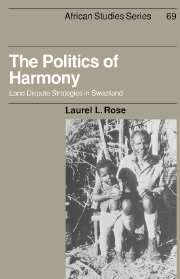Book contents
- Frontmatter
- Contents
- List of figures, tables and maps
- List of cases
- Acknowledgements
- Glossary
- Introduction
- PART I NATIONAL AND LOCAL SETTINGS
- PART II HARMONY AND LAND
- 4 The politics of harmony: land dispute strategies
- 5 Land dispute cases in the Swazi hierarchy
- 6 ‘A woman is like a field’: Swazi women's land dispute strategies
- 7 ‘How could I take my land dispute to the person with the stick?’: Swazi elites' land dispute strategies
- 8 Conclusions
- Appendix
- Notes
- References
- Index
- Other books in the series
7 - ‘How could I take my land dispute to the person with the stick?’: Swazi elites' land dispute strategies
from PART II - HARMONY AND LAND
Published online by Cambridge University Press: 01 October 2009
- Frontmatter
- Contents
- List of figures, tables and maps
- List of cases
- Acknowledgements
- Glossary
- Introduction
- PART I NATIONAL AND LOCAL SETTINGS
- PART II HARMONY AND LAND
- 4 The politics of harmony: land dispute strategies
- 5 Land dispute cases in the Swazi hierarchy
- 6 ‘A woman is like a field’: Swazi women's land dispute strategies
- 7 ‘How could I take my land dispute to the person with the stick?’: Swazi elites' land dispute strategies
- 8 Conclusions
- Appendix
- Notes
- References
- Index
- Other books in the series
Summary
This chapter describes land cases in which Swazi new elites struggle to assert land administration rights against competing claims of local and national traditional elites. New elites, comprising the new Swazi middle class, are educated and wealthy individuals. They are teachers, clerks, civil servants, traders, agricultural smallholders and artisans. Some are enterprising farmers or urban land holders who have attained some independence from chiefs (see Maasdorp 1976: 416; Picard 1983: 19; Sallinger-McBride and Picard 1984b: 18). As explained, traditional elites are ordinarily royals, members of important clans and territorial chiefs.
The dispute data presented in the following discussion demonstrate how traditional elites in Zombodze use harmony strategies to contain land administration challenges by Kwaluseni new elites. When Kwaluseni new elites are called before the Zombodze council to answer to charges of unauthorized land administration, they enhance their disputing opportunities through assertion, avoidance and deception disputing strategies. However, when new elites preside over internal land disputes in Kwaluseni, they use harmony strategies to enforce their perceived land administration rights against challenges of ‘illegitimacy’ made by some local residents.
New elites and land relations in Africa
The literature on African land tenure systems describes the many roles played by new elites. New elites, unlike women, are commonly credited with having assumed important roles in formulating national land policy and legislation (Silitshena 1979) or in brokering land law codes at the village level (Perry 1977).
- Type
- Chapter
- Information
- The Politics of HarmonyLand Dispute Strategies in Swaziland, pp. 169 - 188Publisher: Cambridge University PressPrint publication year: 1992



